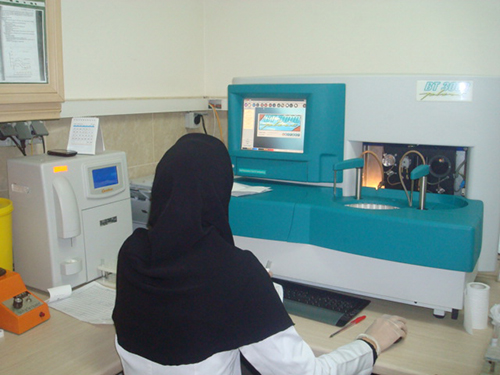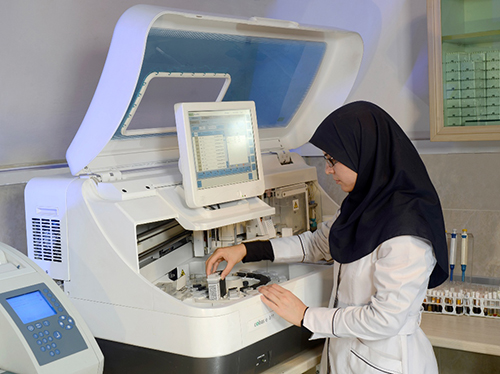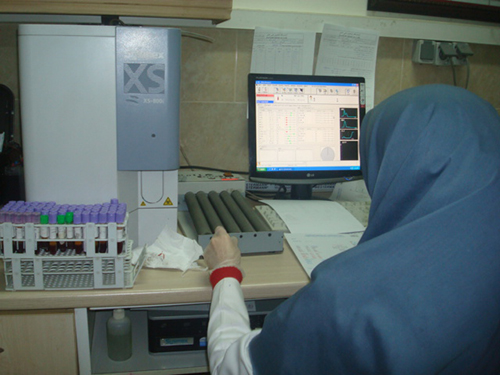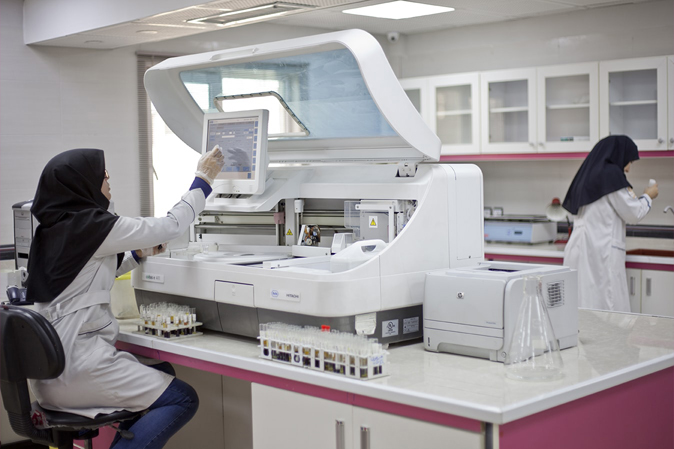Danesh Medical Laboratory:
As a center for diagnostic and laboratory affaires, Danesh Medical Laboratory is the oldest member of Farjad group With nearly two decades of work experience, Danesh Medical Laboratory has been a great help to physicians for early diagnosis of diseases. By expanding and improving the quality and quantity of its services, the lab has tried to take effective steps to improve public health. Since precision and speed are the basic principles and necessities in diagnostic-medical affairs, this center has tried progressively to actualize both using technical staff and advanced, up-to-date equipments. Among these, we can mention getting international certificates ISO 9001-2008 quality management in medical diagnostic tests from URS England and also being under permanent supervision of ASQUALAB international quality control program and EQAP national quality control program
We hope that we can become the most trusted in our diagnosis for the medical community

Reception, Results and Sampling Unit
Reception and Result Unit:
All tests are accepted in Danesh laboratory. Most of the tests are done at the center and, in certain cases, the samples are sent to accredited laboratories in Tehran and abroad (for example, metabolic tests are sent to Wegener laboratory in Germany).
The costs of the tests are based on the tariffs approved by Iran’s Ministry of Health. The center is covered by all insurance companies, complementary insurance, banks and other organizations. Reception is done under the contracts made with these organizations.
The test results become ready in the shortest time possible in Danesh laboratory and are printed after being approved by the person in charge of quality control and being confirmed through laboratory automation system. The lab is equipped with Smart SMS and if the result is ready or replication is needed, the patients are automatically instructed via SMS. The results can be sent to patients and, if needed, to their doctors via e-mail.
It should be noted that in the case the word "emergency" is mentioned by the doctor, the results can be prepared within 2-8 hours after sampling.
Sampling:
High quality results require proper sampling. In Danesh laboratory, sampling is conducted by experienced staff. It should be noted that child sampling is done by a child specialist with 30 years of experience.
In Danesh medical laboratory, blood is taken using dispensable vacuum tubes and blood sample is taken in standard and healthy conditions for each patient.

The Lab Technical Sections:
Biochemistry section:
One of the most active parts of the laboratory is the Biochemistry section. In this section, almost 100 different kinds of tests are done in different ways on samples of blood, urine and other fluids such as spinal liquid and pleural fluid.
In biochemistry section, the tests are conducted by a number of advanced devices including
auto-analyzers such as Mindray BS800, BT3000, Easy Light ISE devices and Certium, Eppendorf ECOM 6125, Nyco CardTM devices, Mini neph, blood gas machine, etc.

Hormonology unit:
This is one of the most crucial sections of the lab. In this section, tests are done on different samples including serum and plasma through various methods such as ELISA, Electro-chemiluminescence and IFA. These tests are done to check diseases related to thyroid hormones, tumor markers, sex hormones (menstrual disorders, sexual dysfunction and infertility, etc.), growth disorders, and pregnancy diagnosis.
Most of the hormonal tests are measured through ECLIA method using Electro-chemiluminesence Cobas e411. It should be noted that this method is one of the most specific and sensitive and one of the latest laboratory methods for measuring hormone levels. Compared to other laboratory methods, this method has a higher level of sensitivity, repeatability, accuracy and precision and thus it is highly trusted and approved by most doctors and qualified professionals.
Other devices in this section include ELISA Reader STAT-FAX 4200, made in the US, Immune-light made by Siemense, Germany, and Immuno-fluorescence made by VIDAS company in France.

Immunology section:
In this section, serology and immunology tests are done which include tests for diagnosis and follow-up of a variety of infectious and autoimmune diseases, including rheumatic diseases (rheumatoid arthritis, rheumatic fever, etc.), infectious diseases (brucellosis and typhoid), types of Hepatitis (A, B, C, E, D), AIDS (HIV), etc.
Hematology section:
This section is equipped with two advanced devices of full differentiation cell counter Sysmex XS 800i manufactured by Sysmex in Japan, and Advia 2120I by Siemens in Germany. In this section, different types of blood disorders such as anemia, thalassemia (minor and major), leukemia and coagulating disorders are examined.
Globule sediment tests (ESR) is done by sedimentation Reader LiNEAR. Blood coagulation tests are performed automatically by Steellex Coagulameter which is able to perform all coagulation tests.

Electrophoresis section:
This section is equipped with MINICAP manufactured by Sebia in France. In this section, hemoglobin electrophoresis and protein electrophoresis and electrophoresis of proteins in blood, urine and other body fluids are examined.
Section of Microbiology, Parasitology and Mycology:
In this section, patients’ samples are examined for the presence of bacteria, fungi, viruses, etc. and many cultures are done by experts to detect kidney, bladder, and intestinal infections. This section includes bacteriology, parasitology, mycology and the analysis of biological fluids. To increase the accuracy of results and better treat patients, the sensitivity and resistance of germs to antibiotics are exactly determined and reported using antebiograph system.
In this section, patients’ samples are studied for intestinal and blood parasites under a microscope in a direct and condensed way.
Other Sections:
Urea breath test:
In Danesh laboratory, Heliprobe manufactured by Kibion in Sweden is used for urea breath test (UBT) to detect H. pylori infection.
Also, MicroH2 made by Micro Medical Company in England is used for hydrogen breath test (HBT) as a diagnostic tool for people suffering from irritable bowel syndrome (IBS), an overgrowth of bacteria, and sugar intolerance.
Also, using Nonoduct sweat test set made by Wescor in the US, electrolytes are measured in sweat to assess the risk of CF (cystic fibrosis) in children with a family history of CF, diarrhea, malnutrition and growth failure.
In Allergy section, allergy tests are done using RIDA in which each sample is examined for its allergy to 20 respiratory or digestive allergens defined in children, adults, respiratory, gastrointestinal, and respiratory-digestive panels.
Quality Control Section:
This section is one of the most important sections in Danesh laboratory. The accuracy and precision of the results is ensured under the direct supervision of the quality control supervisor. In this section, the laboratory methods, equipment performance verification, and test results are checked through scientific and statistical methods on a regular basis.
In addition to the above activities concerning quality control, internal audits are periodically performed in different sections of the laboratory and the relevant section head is reminded about the corrective measures which will have to be considered in the next audit.
In order to promote the quality of services, Danesh Medical Laboratory regularly participates in foreign and domestic quality control programs of ASQUALAB in France and EQAP in Iran.




